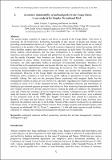| dc.contributor.author | Tieguhong, Julius Chupezi | en |
| dc.contributor.author | Zwolinski, Janusz | en |
| dc.coverage.spatial | China | en |
| dc.coverage.spatial | West Africa | |
| dc.date.accessioned | 2016-06-23T15:04:05Z | |
| dc.date.available | 2016-06-23T15:04:05Z | |
| dc.date.issued | 2008 | en |
| dc.identifier.citation | Tieguhong, J. and Zwolinski, J. (2008) Economic sustainability of national parks in the Congo Basin : a case study of the Sangha Tri-national Park. Presented at International symposium on emerging needs of society from forest ecosystems : towards the opportunities and dilemmas in forest managerial economics and accounting, Ljubljana, Slovenia, 30th November 2008. | en |
| dc.identifier.uri | https://opendocs.ids.ac.uk/opendocs/handle/20.500.12413/11910 | |
| dc.description.abstract | The second largest complex of tropical rain forest is located in the Congo Basin. This forest is
renowned for its biodiversity, harbouring thousands of rare species of plants and animals and
providing environmental services at a global level. At the same time these forests are of critical
importance to the people of the region. The local economies depend on timber harvesting, while the
forest dwellers support their subsistence with forest products on daily basis. The dilema faced by
policy makers, conservationists and the local communities is in merging the various ideals,
objectives and needs at a local, national and global level in order to sustain the forests, their fauna
and the people. Examples from Southern and Eastern Africa have shown that, with the right
management in place, natural ecosystems managed jointly for ecotourism, conservation and
recreation, can yield appreciable benfits at minimum environmental destruction. Therefore it is
believed that well-organized tourism can become the best way to use the Congo Basin’s forests for
creating economic opportunities without destroying the resources. The challenge therefore, is in
convincing decision-makers that conservation of forests can provide for sustainable economic
development. However in the Congo Basin this potential has not been demonstrated thus far.
Deliberate policy initiatives to cost recovery, profit making or generation of local business are
woefully lacking. Not only are the protected forests maintained with marginal funds, but the
management systems in place are also ineffective, especially regarding poor financial management
resulting in losses of 2/3 of the expected revenue. The centralized collection and distribution of
funding by government agencies prevents local initiatives from achieving financial sustainability. It
also remains unclear how the fees paid by tourists visiting the parks are related to the operational
costs and if these fee structures do in fact approximate tourists’ willingness-to-pay (WTP). In this
study the factors of (i) tourists’ WTP higher entrance fees and (ii) duration of stay, were evaluated
in two protected areas of the 28000 km2 Sangha Tri-National Park shared by Cameroon, the
Republic of Congo and the Central African Republic. It was found that if park facilities were
improved the potential entry fee in the Lobeke National Park could be increased by an additional
US$ 10 per visitor. At the Dzanga-Ndoki National Park, foreign, resident and national tourists could
be paying an additional US$ 30, 20 and 7, respectively. To this end improvements in park facilities,
efficiency in entrance fee setting and management structures are recommended. | en |
| dc.language.iso | en | en |
| dc.rights.uri | http://creativecommons.org/licenses/by-nc-nd/4.0/ | en |
| dc.title | Economic sustainability of national parks in the Congo Basin : a case study of the Sangha Tri-national Park | en |
| dc.type | Conference paper | en |
| dc.identifier.externaluri | https://doi.org/10.35648/20.500.12413/11781/ii128 | |
| dc.identifier.ag | RES-167-25-0257, ES/E021816/1 | en |
| dc.identifier.doi | 10.35648/20.500.12413/11781/ii128 | |


